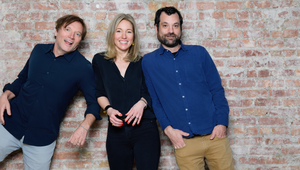
5 Minutes With... Javier Campopiano

From zombie grannies to pneumatic girlfriends with a tendency to adopt scabby stray cats, Javier Campopiano’s back catalogue of work is littered with the skewed comedy creations that have catapulted him into the vanguard of Latin American advertising. Having conquered one continent, he’s now moved northwards to the States for a fresh challenge. LBB's editor Gabrielle Lott caught up with Javier to discuss his new role as Chief Creative Officer at Draftfcb NYC.
LBB> The Javier Campopiano advertising story began in 1997… but talk to us about your background and how you came to be in this industry? You've just taken the role of CCO at Draftfcb NYC this year - can you describe to us what your position entails and what your goals are?
JC> I started a small communication/design company with a classmate when I was at university. There we’d do almost everything: design, advertising, media, being the delivery boy. When I realized that I wouldn´t ever be able to shoot a TV spot in my life due to the small clients we had, I started to look for a job in the main agencies. I was lucky; three months later I was working at Ogilvy as a copywriter.
The CCO position means that I have ultimate responsibility for the creative product of the office. It might sound redundant, but sometimes we forget that it is our main duty. From that point of view, my goal is to be proud of it, to be happy to put my name to the work, and you only achieve that by building a team comprised of believers. I am a believer. Unlike too many people in the advertising industry, I don´t have a drop of cynicism about our job and I know that my first assignment will be to inspire that to the rest of the team. Once you have a ship full of believers you can go anywhere.
LBB> You've worked in some major agencies, including Del Campo Saatchi & Saatchi, regarded by many as the hottest house in South America. What was it about Draftfcb Buenos Aires and its offering that persuaded you to join them?
JC> The chance to lead the creative department. And the fact that, in the interview stage, I met a lot of top people from Draftfcb and I sensed the same in everyone; that this was a young company. It was developing its personality and they were looking for someone with the hunger to be part of defining it, to have a creative voice in that process. There is not much you can add to 90 per cent of the big networks, but I felt – and, luckily I was right – that I could add something of my own to Draftfcb.
LBB> Crossing the continent, what are the biggest differences you see between LATAM and North America in advertising?
JC> Latin American advertising was led by two countries in the very beginning, Argentina and Brazil. That is where it all came from. The good thing is that today you can find very strong work in almost every country in LATAM. Having said that, Brazil and Argentina are well known for two main skills; telling stories in Argentina, and simple ideas with a superlative quality of the graphic dimension in the case of Brazil. But the main fact is that in both countries, advertising is part of the pop culture. Admen are rock stars in Brazil, while at Argentinian barbecues – we say asados – people talk about the latest spots they have watched. So it is not just about passion, that word which is always related to the work of any Latino, it is about a tradition that is in the DNA of these countries. Then you can focus on the idiosyncratic differences. We, by definition, are less respectful to the rules, which can be a factor of success in advertising. We push for ideas very far from the conventional limits.
LBB> You've won many awards, several Lions and an Outdoor Cannes Grand Prix... How important are awards to you and the industry?
JC> It might be politically correct to criticize awards, but the truth in my opinion is that awards are necessary for our industry. Awards are fuel. Fuel for the pride you feel for a piece of work you might have done a long time ago which suddenly gets a recognition you didn´t expect. Fuel because awards ignite envy in its best form, the ‘I should've done that’ feeling. Fuel because of the inspiration of seeing tonnes of great work. The problem is to confuse awards with the vehicle instead of the fuel, and make them the goal of our efforts. If you think of them as a boost of energy that you can use to produce more great work, there is not a wrong side about it. We can´t forget that advertising is an industry where business meets art all the time. The artist side in us will always welcome some peer recognition.
LBB> Speaking to Coca Cola's Integrated Marketing Director last year, he mentioned that in Latin America many teenagers don't have Internet access because of cost - while in the States it's a key channel to access that demographic. What are your observations of differences in mobile/digital content and campaigns between the regions?
JC> The differences between regions with better/worse technologies standards do exist, but I think the main gap is that in Latin America we still see the digital world as a little far away, and because of that we idealize the making of digital work. As a consequence, sometimes it seems that making a digital campaign is more important than the reason why we are doing it, and that is because many agencies and clients feel that they must check the ‘we must go digital’ box. The best samples of great digital work, like Old Spice Responses, are not as easy to categorize. It started on TV, went digital, returned to TV… I know that Latin America will soon bring what it has shown in the last years in multiple categories into the digital world. However, access to more and better technology really needs to improve for creatives to feel that they dominate the field as they do in any others like TV or activation.
LBB> Comedy is such a prevalent feature of your work, yet it is such a notoriously difficult skill. What is the key to creating successful comedy, how do you sell it to the client and is this harder outside of Latin America?
JC> The kind of comedy I like always has an element of truth in it, something you can relate your own life to or a thought with an inner wisdom you can’t deny. Only then, after that truth, comes the joke. The tricky thing about comedy is that if it doesn´t make you laugh, no one will laugh, but the fact that you laugh is not a guarantee other people will. I really try to do my homework by watching a lot of comedy and reading great comedy writers. I try to find some rules for a matter that is so subjective, personal and irrational.
In my career, selling comedy has been way easier than selling some serious and emotional campaigns. When you are coming up with really serious or profound thinking for a brand (and I mean a real thought, not just a corny manifesto) then that is when everyone starts to feel tense. You are saying something, making a statement. On the other hand, when you use comedy, it doesn’t matter if the selling line or the thinking is serious and pretentious, they were preceded by a joke and that makes the difference.
Comedy is a universal way to connect with people. In Latin America we´ve learned comedy from the rest of the world, especially from some European movies and American comedy culture, from the Marx Brothers to Girls. In that context, I think clients in New York are as ready as those in Argentina to buy comedy.
LBB> How does Draftfcb promote and find young creative talent?
JC> Hopefully we attract the finest talent through our work. The amount of good portfolios you receive could be a measure of the work an agency is doing. Creative schools are helpful as well; I used to teach copywriting for some years, and I found a lot of talents there. Draftfcb is a big network where we value and promote great work and talent; creatives are usually asked for projects all over the world, they have the chance to meet with even more talented people in diverse places, they feel loved and cared for, which is at the end what will keep them working with us.
LBB> What does 2013 look like for you and the network?
JC> It looks great. We have a lot of work to do. That’s the best possible scenario.















